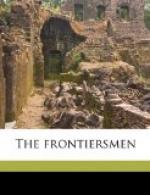In the abrupt pause in this headlong career it was difficult to sustain one’s poise. Now and again, indeed, sheepish conscious glances were interchanged; for since the grievance of the cow-drivers had been publicly annulled and the horses of the Blue Lick Stationers had been restored in pure neighborly good-will, a resumption of the quarrel on the old invalid scores was impossible. Perhaps some token of their displeasure might have been visited upon her who had inaugurated so bold and extensive a wild goose chase, but she looked so small as she sat by the cannon weeping her large tears that she disarmed retaliation.
So small she looked, indeed, that certain of the young blades, who filed in to gaze upon her and filed out again, would not believe that she could have invented so large a French invasion, and for several days they futilely scouted the woods in search of some errant “parlez-vous,” all of whom, however, were very discreetly tucked away within the strong defenses of Fort Toulouse.
The young gunner alone was implacable. He was the first of the returning force to reach Fort Prince George, and he carried with him all the powder that had been sent under mistake to the Blue Lick Station, together with the tear-shotted cartridges, whose problematic interior damage he explained to the amazed, chagrined, and nonplussed commandant.
“Oh, sor,” the gunner said in conclusion, solemnly shaking his head, “that gurl, sor!—she is a wily one! An’ I should n’t be surprised, sor, if she is a dale taller than she looks!”
The Blue Lick Station in time recovered its equilibrium, and was afterward prone to protest that of all frontier communities it bore the palm for the efficiency of its “linguister.”
A VICTOR AT CHUNGKE
At Tennessee Town, on the Tennessee River, there used to be a great chungke-yard. It was laid off in a wide rectangular area nine hundred feet long, two feet lower than the surface of the ground, level as a floor, and covered with fine white sand. The ancient, curiously shaped chungke-stones, fashioned with much labor from the hardest rock, perfect despite immemorial use, kept with the strictest care, exempt by law from burial with the effects of the dead, were the property of this Cherokee town, and no more to be removed thence than the council-house,—the great rotunda at one side of the “beloved square,” built upon a mound in the centre of the village.
Surely no spot could seem more felicitously chosen for the favorite Indian game. The ground rose about the chungke-yard like the walls of an amphitheatre, on every side save the slope toward the “beloved square” and the river, furnishing an ideal position of vantage for spectators were they even more numerous than the hundreds of Cherokees of all ages that had gathered on the steep acclivities to overlook the game—some ranged on the terrace or turfy ridge around the chungke-yard,




